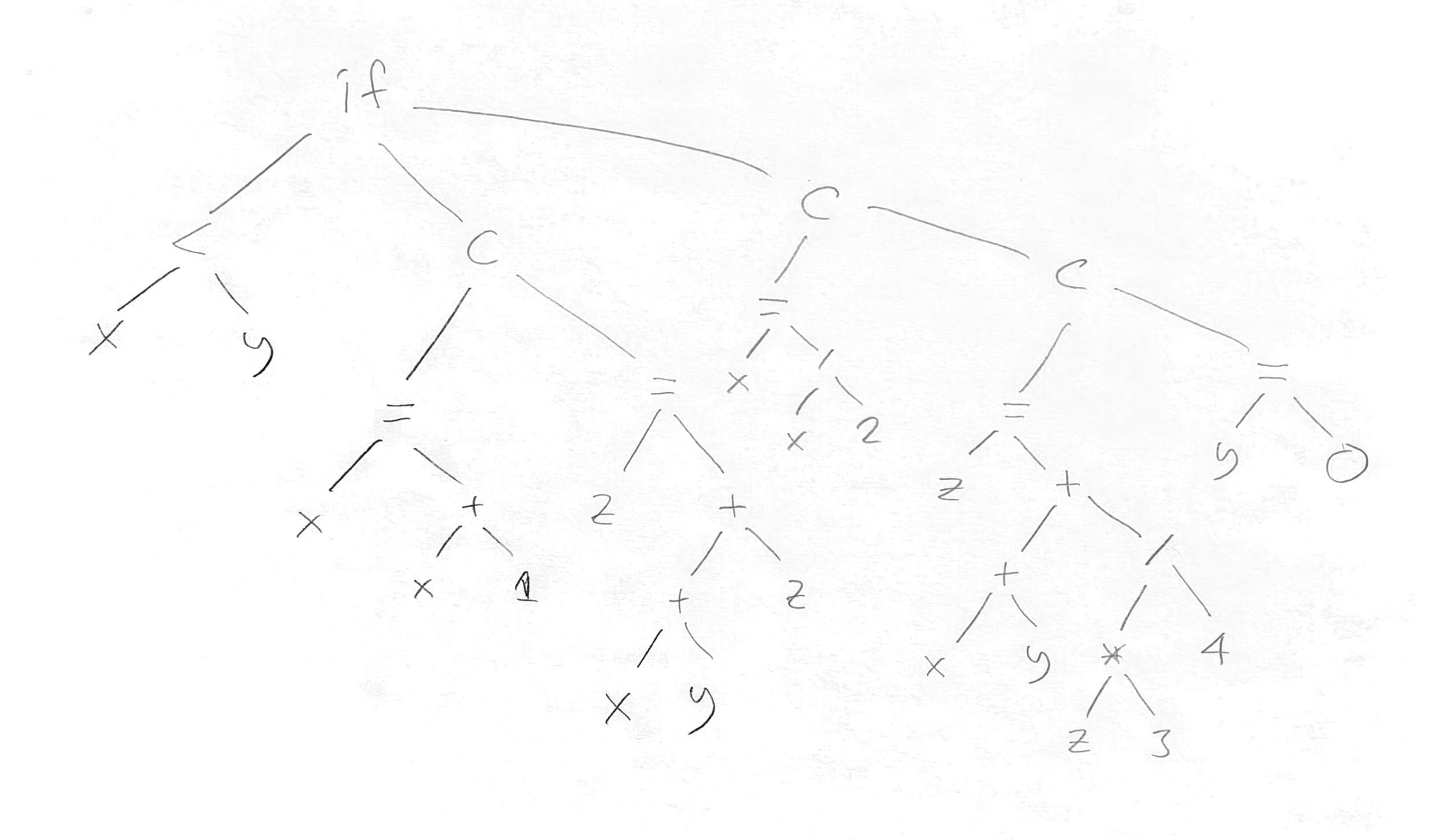
Answer:
See also the book or the lecture notes, especially this figure, with the addition of the machine-dependent optimizer.
| Program | Error |
|---|---|
#include <stdio.h>
#include <math.h>
int Main(void) {
printf("Ange x: ");
int x;
scanf("%d", &x);
printf("Ange n: );
int *n;
scanf("%d", n);
for (int i = 1; i <= n; ++i) {
int res = pow(x, i);
printf("%d ** %d = %d\n", x, i, res);
}
}
|
undefined reference to `main' missing terminating " character 'n' is used uninitialized comparison between pointer and integer undefined reference to `pow' expected ')' before ';' token |
if (x < y) {
x = x + 1;
z = x + y + z;
}
else {
x = x / c;
z = x + y + z * 3 / 4;
y = 0;
}
Translate the program segment to two of the following three types of representations. (Should you answer with all three, the one with the highest points will be discarded.)
a) an abstract syntax tree (by drawing it)
Answer:

b) postfix code for a stack machine
Answer:
rvalue x
rvalue y
<
gofalse ELSE-START
lvalue x
rvalue x
push 1
+
=
lvalue z
rvalue x
rvalue y
+
rvalue z
+
=
jump AFTER-ELSE
label ELSE-START:
lvalue x
rvalue x
push 2
/
=
lvalue z
rvalue x
rvalue y
+
rvalue z
push 3
*
push 4
/
+
=
lvalue y
push 0
=
label AFTER-ELSE:
c) three-address code
Answer:
if x >= y goto ELSE-START
x = x + 1
t1 = x + y
z = t1 + z
goto AFTER-ELSE
label ELSE-START:
x = x / 2
t2 = x + y
t3 = z * 3
t4 = t3 / 4
z = t2 + t4
y = 0
label AFTER-ELSE:
Or, if we number the instructions and use those numbers instead of labels:
(1) if x >= y goto (6) (2) x = x + 1 (3) t1 = x + y (4) z = t1 + z (5) goto (12) (6) x = x / 2 (7) t2 = x + y (8) t3 = z * 3 (9) t4 = t3 / 4 (10) z = t2 + t4 (11) y = 0 (12) ....
(1) t1 = a + b (2) x = t1 / c (3) t2 = a + b (4) c = 4 * t2 (5) t3 = x + y (6) t4 = a + b (7) if t3 >= t4 goto (11) (8) c = c + x (9) a = a - 1 (10) goto (5) (11) ... |
a) Some of the code might seem unnecessarily long, with all these temporary variables t1, t2 and so on. For example, couldn't the first two instructions have been replaced by the single instruction x = (a + b) / c? Explain!
Answer:
It's three-adress code, not four-address code! x, a, b and c are four variables.
b) Which basic blocks are there?
Answer:
Three blocks: instruction 1-4, instruction 5-7, and instruction 8-10.
c) Show an optimization that can be performed on the code!
Answer:
Instruction (1) and (3) have a common subexpression, a + b. (Not instruction (6), since a will have changed in later iterations of the loop.) The variable t2 and the instruction (3) can therefore be removed, and in instruction (4) we use t1 instead of t2.
The expression x + y is constant in the loop, so instruction (5) can be moved to before the loop.
S -> a T | a U
T -> b c
U -> b d
a) Why is this grammar not suitable for implementation in a top-down, predictive recursive-descent parser?
Answer:
There is a FIRST() conflict between the expansion a T and a U for the non-terminal S, so when the parser finds the token a in the input, it will not know which of the two productions to use. It wouldn't know which branch of the if statement to enter.
b) Show how the input a b c is parsed using a bottom-up parser with a stack. Show which shift and reduce operations are performed.
Answer:
Answer:
meeting lecture lab done date time place
b) (2p) Out of these terminals, some will not have fixed lexemes. Write regular expressions for each such terminal.
Answer:
date: 2[0-9][0-9][0-9]-[0-1][0-9]-[0-2][0-9]
time: [0-2][0-9]:[0-5][0-9]
place: [A-Za-z0-9]+
Answer:
input -> commands done
commands -> command commands | ε
command -> meeting time_and_place
| lecture time_and_place
| lab time_and_place
time_and_place -> date time time place
Answer:
For testing, you can download calendarparser.c, plus a Lex scanner specifikation calendar.l, and a Bison version of the grammar calendar.y, and a Makefile.
Since the grammar from the solution to the task above is already suitable for constructing a predictive recursive-descent parser, we can use it directly. Otherwise, we would have had to make some transformations.
int lookahead;
int scan(void) {
return yylex();
}
void error() {
printf("There has been an error. Sorry.\n");
exit(EXIT_FAILURE);
}
void match(int expected) {
if (lookahead != expected)
error();
else
lookahead = scan();
}
void input(void);
void commands(void);
void command(void);
void time_and_place(void);
void input(void) {
commands(); match(DONE);
}
void commands(void) {
if (lookahead == MEETING || lookahead == LECTURE || lookahead == LAB) {
command(); commands();
}
else {
/* Empty */
}
}
void command(void) {
if (lookahead == MEETING) {
match(MEETING); time_and_place();
}
else if (lookahead == LECTURE) {
match(LECTURE); time_and_place();
}
else if (lookahead == LAB) {
match(LAB); time_and_place();
}
else {
error();
}
}
void time_and_place(void) {
match(DATE); match(TIME); match(TIME); match(PLACE);
}
void parse() {
lookahead = scan();
input();
printf("Ok.\n");
}